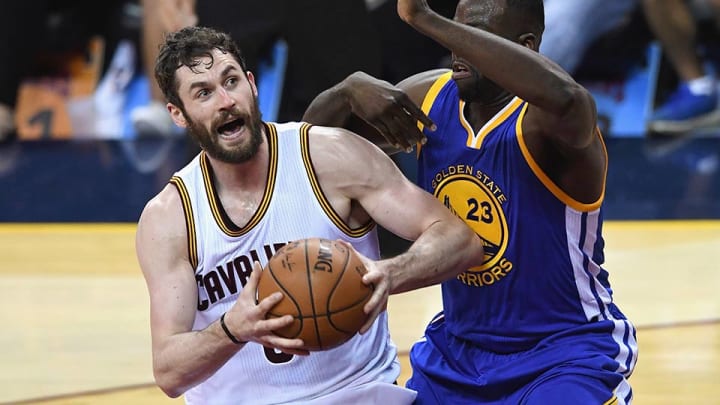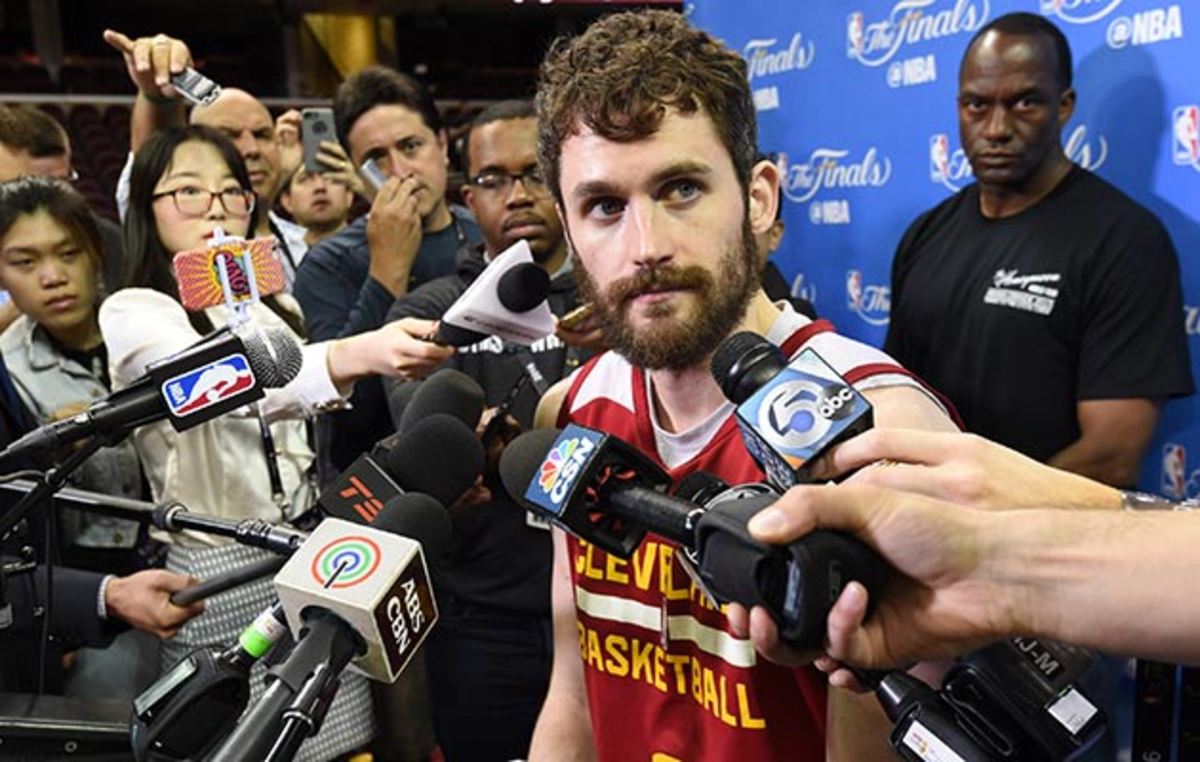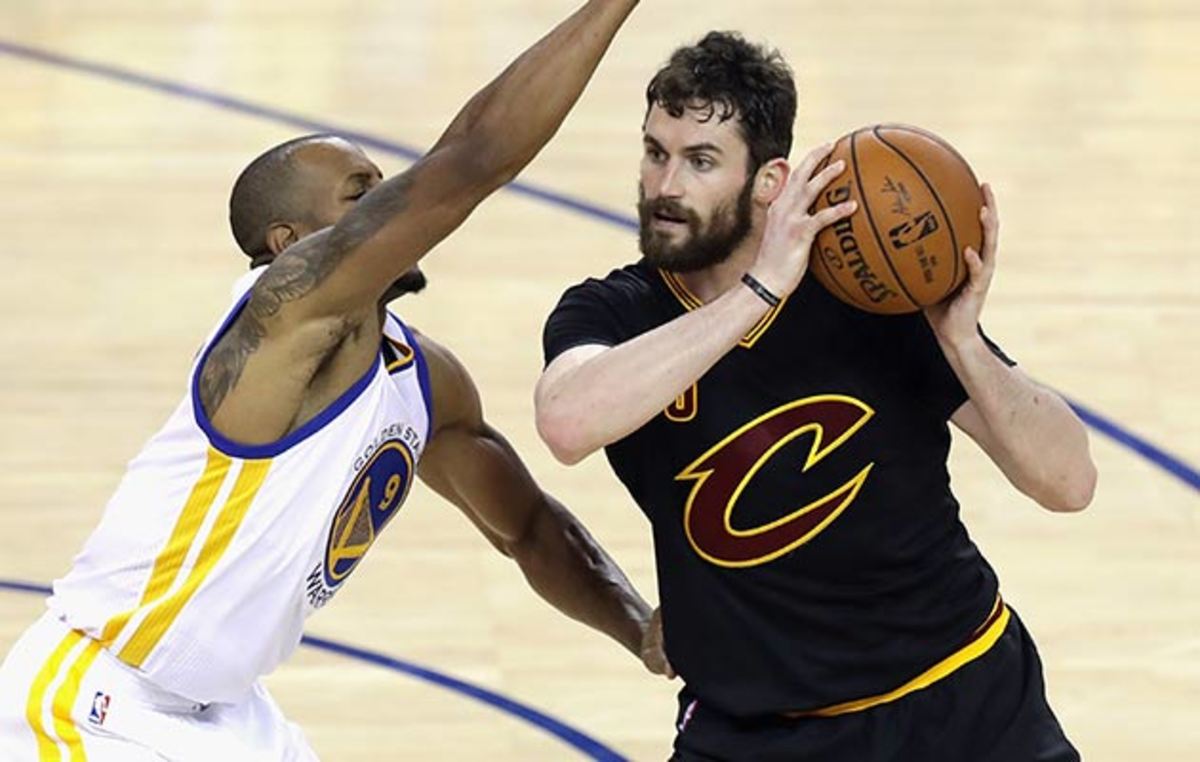How did we get here with Kevin Love?

Your teams. Your favorite writers. Wherever you want them. Personalize SI with our new App. Install on iOS or Android.
CLEVELAND — Kevin Love averaged 26 points, 12.5 rebounds, and 4.5 assists in his final season with the Timberwolves. Two years later, the Cavaliers are down 3–2 heading into Game 6, and in a series that's gotten progressively stranger as it's unfolded, the strangest story of all is Love, who is averaging 8.8 points and 6 rebounds in the Finals so far.
It's been hard to watch, and it keeps getting worse. A concussion in Game 2 gave way to a full-on disappearance in Game 5, with two points and three rebounds in 33 minutes. What is happening here?
"We definitely need him," LeBron James told reporters Wednesday. "We definitely need Kev to play better. We want him to play better, but we don't want to add no more stress on him or added pressure. We just want him to go out and play, just let it hang out."
One of the hardest parts of watching Love the past two weeks is that about a month ago, all this seemed to be settled. They were dominating the East, there were Lil Kev pranks, there were family dinners... now he's out of the family photos and getting scratched off the posters, and we're all watching it happen in slow motion.
The story's not over, of course. But while we wait for Game 6, one of the most interesting questions of this series is: How did we get here with Kevin Love?
Here are some ideas.

No. 1: He's not terrible, but the Cavs have never been a great fit.
What made Love great in Minnesota was his ability to score from inside and outside. He dominated the ball, but he was efficient in doing so. He could score down low, he rebounded, he operated well out of the high post, and then he sprinkled in some threes to make it even more unfair. The problem in Cleveland is that many of those skills have suffered from atrophy, because he spends most of his time floating around the perimeter. The do-everything power forward, who was named after Wes Unseld, has spent much of the past two seasons playing like a bigger (and slower) Chandler Parsons.
• MORE NBA: Lee Jenkins on Warriors' 'best game of any of our lives'
The problem: the Cavs have too much talent elsewhere. Love is good out of the high post, but LeBron is better. Love can be effective posting up down low, but LeBron is better there, too, and the offense is much tougher to stop when the ball moves. Likewise, Love is a good rebounder, but if the rest of the offense is better when he's planted on the perimeter and spacing the floor, then his rebounding will suffer accordingly. Half of what made Love great in Minnesota just hasn't been needed in Cleveland, and eventually those skills erode (when, say, it's time to post up Klay Thompson).
It's the same thing that happened with Chris Bosh in Miami, except that Bosh eventually found other ways to contribute—defense, rebounding, passing, and scoring when needed. Love's problem is that he's not as physically gifted as Bosh. Reinventing himself as a floor-stretching rim protector who can switch everything on defense just isn't going to happen. Still, on a different team, with more touches, there's reason to think he can get back to most of what he was in Minnesota.
Unless...
Explanation No. 2: He's not as healthy as he was in Minnesota.
This is entirely speculative, but it's something that'll be considered as teams try to gauge his trade value going forward. There were rumors that Love's transition in Cleveland was hampered by back problems that lingered through much of last year. He sat out certain games for rest, missed time after aggravating his back and finished the season with a separated shoulder and off–season surgery. He also suffered a concussion a week ago, which certainly didn't help as he tries to get comfortable in this series. Maybe injury concerns are overblown. But there's a chance that Love's shift to the perimeter is as much a product of changes to his body as any change of scenery.

Explanation No. 3: The Warriors are a nightmare matchup.
I'm reluctant to buy into the health concerns to explain Love's Finals struggles, mostly because he spent the past two months looking great in the East playoffs. He averaged 18 and 12 against the Pistons, 19 and 12 against the Hawks, and after struggling in two losses to the Raptors, he finished the series with 45 points and 14 rebounds in the final two wins. Then the Warriors happened, and now the entire basketball world is wondering what's wrong with Kevin Love.
The best response to this actually starts with Draymond Green. Go back to the OKC series. The Thunder had all the length to harass Green on offense, neutralize him on defense, and generally make him look ordinary. It got into his head, and his game fell apart. It had me rethinking his value across board. The crotch kick heard round the world got the headlines, but that series was also the first time in four years that Draymond looked like a second–round pick.
• MORE NBA: How the Cavs are exploiting Stephen Curry on defense
Two weeks later, he's probably been the most consistently dominant Warrior against the Cavs, and he looks like a top–15 player all over again. It turns out the Thunder series was just the worst matchup possible for Draymond.
That same logic seems like the most obvious explanation for Love against the Warriors. Even before this series began, people were worried about how he'd fit. Golden State is uniquely positioned to torture him on defense, they are fast and strong enough to guard him inside and outside, and it's all mushroomed into a cloud of mental struggles that have compounded everything.
Explanation No. 4: He was always overrated, and the Finals have exposed him once and for all.
This is the argument that says Love is a "good stats, bad team" player, and all the advanced metrics indicating he was a top–10 player were wrong all along. It's harsh and it seems reactionary. But there's definitely some truth to it, right?
Love is weak defensively during an era in which the best teams in the league are better than ever at finding weak links and exploiting them. Maybe that's not his fault, but it's literally a problem that becomes twice as obvious on a good team. Competing for a title, the games against the best teams are the only ones that matter. It's not just about the Warriors; the Spurs attacked Love the same way in January.
Likewise, while his offense has suffered next to LeBron and Kyrie, it's an open question as to how good any team could be if Love is the first or second option. He can definitely go somewhere else and help, but if a championship is the goal, he may not be good enough to justify the investment on offense and the sacrifices on defense. This is all stuff that teams will consider if the Cavs try to trade him this summer.
Explanation No. 5: Hold on, he's actually playing fine.
"Kevin was great," Tyronn Lue said Wednesday. "I mean, defensively he did a lot of good things. Offensively we have two guys that did something that hasn't been done in NBA history: Two guys score 40 points in a single game. So there wasn't a lot of room or a lot of shots for a lot of other guys because they had a special moment."
This may sound like a coach trying to diffuse a controversy—wait, it's definitely a coach trying to diffuse a controversy—but there's some truth here, too.
LeBron and Kyrie were so good in Game 5 that Love didn't need to score more than two points. He could've grabbed more than three rebounds—especially with Draymond and Bogut gone—but he spent the entire game on the perimeter, spacing the floor while his teammates carved up Marreese Speights and Steph Curry. His defense will never be dominant, but all things considered, he's held up better than most people expected in this series. Love isn't dominating, but the Cavs are winning, and that's all that matters.
*****
Regardless of which answer you choose to explain Kevin Love's struggles, what's most important is this: There's no way Cleveland is getting 80 points per game from LeBron and Kyrie the rest of the series.
If they're going to beat Golden State in Game 6 (and have a chance in Game 7), the Cavs need Love to help. Whether it's rebounding or a few big shots or leveling the playing field with Draymond, Love can't be as invisible as he's been. And as overwhelmed as he's looked over the past week, there's still plenty of room for him to change the story in the next game or two.
Meanwhile, teams around the league—the Celtics, Bulls, Blazers and Knicks—will have to decide what he's worth. Love's been available to varying degrees over the past two seasons, and that won't change this summer. He's still got a ton of talent, and considering the max deals about to be thrown around this summer, trading for Love may be a smarter play than betting on Harrison Barnes or paying DeMar DeRozan an insane amount of money.
On the one hand, I feel guilty focusing this much on any player who's struggling like this on national television. It's uncomfortable, and there are times when it feels cruel. It's not his fault the Warriors are one of the best teams of all time.
On the other hand, this kind of impossible pressure is everything that makes the NBA playoffs so addictive. Basketball leaves individual stars more exposed than any other team sport in the world. The playoffs are where we get to watch those stars face the toughest tests of their career, and then see how they respond. That's what's happening with Kevin Love this week. This is unfair, this is insane, and this is the Finals.
